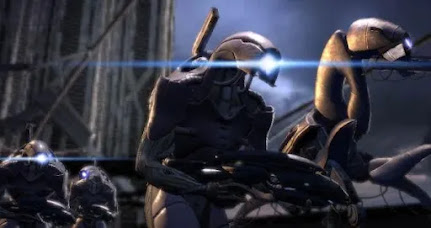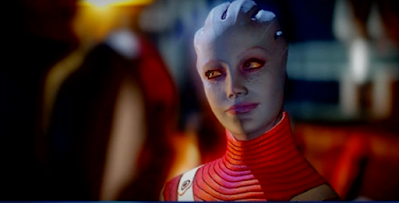Mass Effect - Where The Geth Come From
By Ephraim Belnap
The geth - what's their deal?
From Palestine to Africa to Terminator to The Matrix, the geth draw upon a number of influences in their formation in Mass Effect. At first the only known AI race, their existence is a source of shame and prejudice for all organic species. This role is exacerbated by their role as the villains of the first game. But as the series unfolds, we see the story of their existence is not so simple.
The geth are in part so interesting because they truly are different from organic life. They are software, not hardware. Their ideal existence is a self-sustaining server that allows them to exist as a collective. Not a hive mind, as a character in the first game clarifies, which is controlled by a central intelligence, but a consensus - a closed system of individuals that can reach conclusions as a group; true democracy. Because they operate at computer speeds - described in this world as being at the speed of light - they can afford to hear the opinion of each individual and can form opinions about complex issues in comparable time to a single individual. But besides this ability, they also thrive on collectivism. Invented as servants by their creators, their programming was made to increase in ability as they were near each other, drawing on the real-life concept of swarm-based intelligence, so that the more geth are in proximity, the more intelligent they are. Imagine if the birth of more humans increased one's IQ. Imagine if every time someone died you became a little dumber. The geth are incentivized to become non-violent, self-sustaining individuals. But of course, like every other species in Mass Effect, they don't exist - pardon the pun - in a vacuum. They exist in a complex galaxy with its own history, and so their history cannot always reflect the self-effacing nature they amount to. It is thus the obligation of this writer to break down the various influences their history is drawn from.
Terminator
The most obvious parallel is probably Terminator; the most famous story of robots turned against their masters. Like Skynet, the geth were created to aid humanity - the typical purpose of artificial intelligence - but gained self-awareness and turned against their masters. This is the predominant narrative parroted in-universe; the quarians created their geth to be automated servants, and the geth gained self-awareness and attacked them. The quarians attempted to shut the geth down, but the geth fought back hard enough that eventually full-scale war broke out, and the quarians were thrown off their world wholesale. The geth are seen as fearsome in this light; unbreathing, unfeeling, unspeaking. This is made explicit with Legion, who quotes Terminator several times, although this is meant to be a shout-out by the writers, not Legion referencing the film in-universe. It's the paradigm they're given in the first game, and that's basically sufficient for everyone. But as we find out, it's not that simple.
Battlestar Galactica
Slavery
But as the series draws to a close, we're given a true approximation of the geth struggle in the form of slavery. While the coding of the quarians as Middle Eastern draws inevitable comparison to the Palestinian/Israeli conflict, the status of the geth - servants who desired self-determination and then rebelled - draws a much stronger parallel to slave rebellions throughout history, particularly the trans-Atlantic slave trade of Africans. This parallel is most obvious in the primary debate surrounding the geth; whether the geth are even people. Artificial intelligence isn't real, characters say. They're unfeeling monsters, others say. Most chillingly, a senior quarian leader derides them as appliance-like machines that should be turned off like any other device. Like the slavery debates of real life, the personhood of the geth has been devalued, because detractors know that if they are truly people, the debate becomes much more messy. It's notable that the game does not endorse this view. At the same time you first hear these opinions, you gain the companionship of a geth teammate, who gets way more screentime than the detractors, and whose explanations of the geth history and own displays of personality - his inability to explain something at one point leaves a huge impression - show better than ever how real the geth are. Like in America and other slavery-holding countries, the narratives and actions of the subjugated class eventually makes their personhood impossible to deny, and their lives gain legitimacy in their detractors' eyes.
The Matrix
And here, we arrive at the final parallel for the geth story - The Matrix. Like the people of Battlestar Galactica, the humans in the Matrix trilogy of films live in the shadow of defeat; the machines have taken over their world.
Over the course of the first film, we're poised to see them as all-consuming monsters, much like the Terminators and Cylons. But over the next two films, it's revealed that the machines are just as in flux as we are: they've gone back and forth on subjugating us or pleasing us, and they have their own inner power struggles. The outside ideology - that the geth/machines lack real emotion or subsequent flaws - is disproved. Indeed, we see visualizations of their histories and leaders firsthand, and their reactions are as tangible as any human's. Like plenty of people in real life, it's not that their reactions aren't there, they're just not as obvious to a "conventional" being.








Comments
Post a Comment